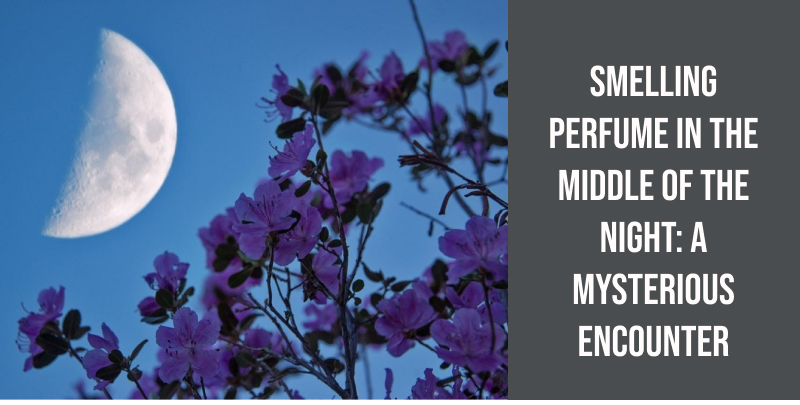Smelling perfume in the middle of the night can be due to several reasons. It could be a residual scent from your own or someone else’s perfume. Another possibility could be olfactory hallucinations, where your brain perceives smells that aren’t present. This could potentially be a sign of an underlying condition such as migraines or even epilepsy. Other mundane possibilities include the smell being carried in from outside through an open window or lingering scent from household products. Lastly, some people might perceive it as a spiritual or paranormal experience, although there’s no scientific evidence supporting this claim.

What Are Night Scents?
Night scents are a fascinating phenomenon that’s intrigued humanity for centuries. These are the fragrances that come to life under the cover of darkness, emanating from flowers and other plants, as well as from human-made products such as perfumes and candles. They’re the perfect complement to a moonlit walk or a romantic evening by the fire.
The most iconic night scents are musks, patchouli, sandalwood, oud, vanilla, and spices. These notes are often associated with seductiveness and sensuality, and have been used in perfumery for centuries. Musks, for instance, have a long history of being a preferred scent for nighttime wear, since they’re warm and inviting, reminiscent of skin. Patchouli, on the other hand, has a strong, earthy fragrance that’s both grounding and sensual, making it a perfect choice for an evening out.
Sandalwood is another popular night scent, thanks to it’s relaxing and calming properties. It’s a soft, woody aroma that’s both soothing and seductive, making it an ideal ingredient for perfumes and candles designed for intimate evenings indoors. Oud, meanwhile, is a dark, rich scent that screams luxury, evoking feelings of exclusivity and decadence. It’s often used in niche fragrances, due to it’s high cost.
Vanilla, the sweet, comforting fragrance, is a classic choice for nighttime wear, thanks to it’s warm, inviting nature. It’s often used as a base note in perfumes, providing a cozy and cozy feel that’s perfect for cuddling up on the couch with a loved one. Spices, like cinnamon and nutmeg, also make excellent night scents, adding an unexpected edge to the fragrance.
As humans, our sense of smell can evoke powerful emotional responses. When it comes to our crushes, our noses can play a particularly powerful role in how we experience desire. The way that their pheromones and scent combine in our minds can create a heady cocktail of longing, anticipation, and hope. It’s a phenomenon that touches on some of the most primal parts of our human nature, and one that many of us have experienced firsthand.
Why Can I Randomly Smell My Crush?
Your brain has associated the scent of your crush with positive emotions and feelings. Every time you catch a whiff of his signature scent, your mind automatically connects it with him, triggering a sense of pleasure and attraction. This is because our olfactory senses go straight to the limbic system, the part of our brain that’s responsible for emotions and memories, making it a powerful tool in creating imprints on our brains.
However, it’s important to remember that scent is just one aspect of attraction and that a persons character, values, and personality are also crucial factors to consider when pursuing a relationship. While it’s perfectly natural to feel drawn to someone based on their scent, it’s essential to take the time to get to know them as a whole person, rather than relying solely on your sense of smell.
The unique scent that they give off triggers a Pavlovian response within our brains, making us associate them with positive emotions and feelings of pleasure. So, embrace your sense of smell, but don’t forget to look at the big picture.
Night fragrance is something that can help you set the perfect mood for a romantic night out or a relaxing evening at home. These scents are specially designed to be worn after dark, and offer a deep, alluring aroma that can help you feel confident and radiant. But what exactly is a night fragrance, and how does it differ from other types of perfume? Let’s take a closer look at this intriguing and mysterious type of scent.
What Does Night Fragrance Mean?
It’s designed to embrace the darkness of the night, reflecting the mysterious and seductive ambience that comes with it. This type of fragrance tends to be more mature, with a heavier and longer-lasting composition that can linger throughout the night.
The notes in a night fragrance are carefully curated to bring a sense of depth and complexity to the scent. Top notes in night fragrances tend to be more subdued, often featuring earthy notes like bergamot or grapefruit. As the fragrance settles into the skin, middle notes come through, featuring heavier floral or spice notes like jasmine or cinnamon. Finally, base notes round out the fragrance with deep notes like musk, amber, and sandalwood.
Night fragrances can also help to enhance mood and promote relaxation. The aromas found in these fragrances can help to calm the senses and ease stress, making them a popular choice for those looking to unwind after a long day.
With it’s rich and sultry notes, it’s the perfect companion for a night out, a romantic evening in, or simply for relaxing and unwinding after a long day.
It’s common knowledge that fragrances marketed as night perfumes are usually heavier and more intense than their daywear counterparts. However, that doesn’t necessarily mean you can’t wear them during the day. At the end of the day, the goal of wearing perfume is to feel confident and happy. So, if you love a certain fragrance and it brings you joy no matter the time of day, then go ahead and wear it!
Can I Wear Night Perfume at Day?
There’s no one-size-fits-all answer to the question of whether or not you can wear a night perfume during the day. Ultimately, it comes down to personal preference and the specific fragrance itself. Some night perfumes may be too heavy or musky for daytime wear, while others may be perfectly appropriate.
In general, it’s a good idea to consider the notes and composition of a perfume before deciding when to wear it. For example, a scent with heavy, spicy notes may be better suited to cooler evening temperatures, while a lighter, floral scent may be more appropriate for daytime wear.
If youre going to a formal event in the evening, a more complex, sophisticated fragrance may be more appropriate than a light, fruity scent. On the other hand, if youre simply running errands during the day, a casual, everyday fragrance may be just fine.
Ultimately, the decision of when to wear a particular perfume is entirely up to the individual. If you love a certain scent and feel confident wearing it at any time of day or night, then go ahead and wear it whenever you like.
It’s worth noting, however, that some fragrance experts may recommend against wearing heavier, more intense scents during the day, as they can be overwhelming or distracting in certain settings. If youre concerned about this, it may be a good idea to experiment with different fragrances and find one that works well for both day and night wear.
The scent of jasmine is loved by many, and it’s presence can evoke feelings of relaxation and calmness. But have you ever wondered why jasmine’s fragrance seems to be more potent at night? The answer lies in a compound called linalool, which plays a crucial role in jasmine’s aroma, especially during the late hours. In this article, we’ll explore the fascinating science behind linalool and the lingering scent of jasmine at night.
What Does It Mean When You Smell Jasmine at Night?
The scent of jasmine is often associated with romance and love. It’s said to bring about feelings of relaxation, calmness, and sensuality. The fragrance of jasmine is often used in perfumes, candles, and other beauty products due to it’s alluring aroma. The scent is particularly noticeable at night when the temperature drops, creating a perfect environment for the perfume to linger.
There are various reasons this scent might be noticed at night. One of the most significant reasons is the activation of linalool, a natural organic compound found in jasmine. Linalools activation leads to an increase in the scent of jasmine flowers during the night, as it’s released from the plant during this time. The chemical compound is responsible for the floral scent that’s released from the jasmine flowers, and it’s this compounds presence that makes jasmine so distinctive.
In addition to it’s alluring fragrance, jasmine is often associated with religious and cultural practices. The flower is sometimes used in various spiritual rituals worldwide, with some cultures believing that it can ward off evil spirits or invoke positive energy. Jasmine has been used for medicinal purposes, with relevant studies proving that it can help reduce anxiety levels and decrease stress hormones.
The aroma of this gorgeous plant can evoke feelings of relaxation, sensuality, and romance.
The timing and intensity of a flower’s scent can reveal a lot about it’s relationship with it’s pollinators. While some blooms produce their most alluring fragrance during the day to attract bees and butterflies, others save their most potent aroma for the night when they’re pollinated by nocturnal creatures like moths and bats. Among these flowers, roses stand out for their uniquely captivating scent that seems to intensify as the sun goes down. But what makes the scent of rose flowers so alluring at night, and why have they evolved to attract the creatures that come out after dark?
Why Do Rose Flowers Produce Good Scent at Night?
One of the reasons why rose flowers produce good scent at night has to do with their reproductive strategy. As mentioned, blooms that emit their scent at night are mainly pollinated by night creatures like moths and bats. These animals are nocturnal and prefer to feed on nectar and pollen during the night when temperatures are cooler and humidity is higher.
Roses emit a complex mixture of volatile organic compounds, including terpenes, phenylpropanoids, and benzenoids. Some of these compounds, such as linalool, eugenol, and citronellol, are known for their calming and relaxing effects on the human mind, making them popular ingredients in perfumes and aromatherapy.
For one, it helps to deter herbivores and pests that may want to feed on the plants leaves and flowers. Some of the volatile compounds emitted by rose flowers have been found to have insecticide and antifungal properties, making them effective at repelling insects and other pests.
Their ability to adapt to different environmental conditions ensures that their scent remains intense even when temperatures are lower. The chemical compounds that make up their scent also serve multiple purposes, including repelling pests and offering calming and relaxing effects.
Conclusion
The ability to detect a familiar scent can bring back memories and emotions that we may have thought were long forgotten. Whether it be the smell of a loved one’s perfume in the middle of the night, or the aroma of freshly baked bread in the morning, our sense of smell has the ability to transport us to different times and places. As we go about our daily lives, it’s important to take a moment to stop and appreciate the scents around us, as they can often hold a deeper meaning than we may initially realize.





